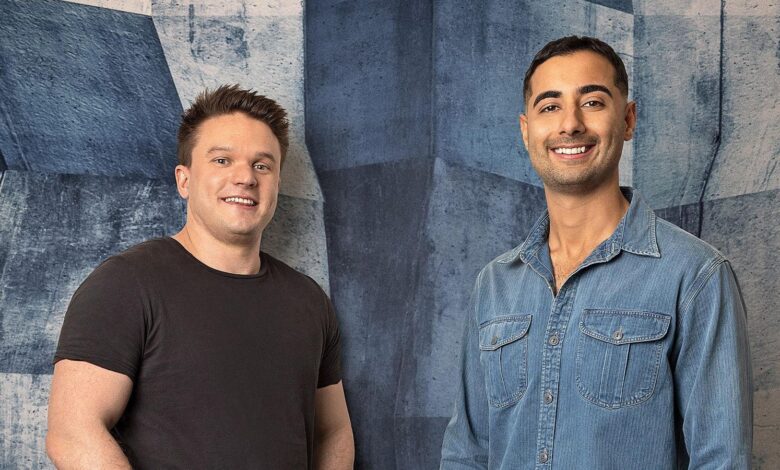These Entrepreneurs Went All In On A Crypto Casino—And Became Billionaires

Ed Craven and Bijan Tehrani parlayed Stake’s success into launching a streaming platform, sponsoring an F1 team—and billion-dollar fortunes.
By Matt Craig, Forbes Staff
It’s fitting that Ed Craven and Bijan Tehrani first met online, where, as enterprising teenagers, they developed a way for players of Runescape, an old-school online video game, to wager on fights between them using in-game digital gold coins. The scheme, called “staking,” was profitable, until it reportedly got them booted from the platform. “I wouldn’t say so much kicked off,” says Craven, an Australian, with a sly smile. “But it definitely wasn’t looked too highly upon by the game’s creators.”
Just over a decade later, the 28-year-old Craven and 30-year-old Tehrani run Stake.com, the largest offshore crypto casino in the world. Stake generated $2.6 billion in revenue last year—despite crypto gambling being unavailable in the United States, United Kingdom and much of Europe. The pair’s instinct for marketing and willingness to operate in legal gray areas have made them two of the youngest self-made billionaires in the world, worth an estimated $1.3 billion each.
Craven and Tehrani, who operate from Melbourne, Australia, have used their fortunes to put Stake’s name on Formula 1 cars, English Premier League jerseys, UFC octagons and a new livestreaming service. But what they really want, more than anything, is legitimacy. For which no price is too high.
“We’ve taken two of the most controversial technologies and industries and combined them,” Craven says. “So it’s always been an uphill battle for us to beat public perception of what the company may stand for.”
The duo began dabbling with crypto in 2013, when Bitcoin was trading for around $100. Along with a few friends, they coded a primitive game called Primedice, which lets users bet Bitcoin on the roll of a virtual die. Primedice generated enough profit to make it a full-time job for its teenage creators. Their ambitions grew in the spring of 2016, when they opened an office in Melbourne and founded their company, Easygo, with 18 employees. Easygo launched Stake the following year, eventually adding slots, table games and a sportsbook, with all wagers in cryptocurrency.
Their timing was great. By late 2017, a single Bitcoin was worth north of $10,000 (it’s currently above $60,000), and an ever-growing number of people believed it could be the future of money. “They were not really businessmen back in those days; they were community leaders,” says Tim Heath, a crypto pioneer and the founder of Yolo, an Estonia-based crypto casino and venture investment firm. “Their P&Ls were probably done in Excel—it’s not like a professional outfit.”
In that early period, crypto laws and regulations were practically nonexistent and casinos could get licensed in offshore havens like Curaçao, where Stake is licensed and taxes are minimal. The lack of oversight enabled Stake to keep costs low and offer gamblers better odds. Players were kept anonymous from authorities and paid no transaction fees.
The category grew in popularity, even as one online gaming review site, Casinomeister, calls Curaçao a “laughable operator” because of its lack of consumer protections, player verification or enforcement against scams. In January, Curaçao’s minister of finance admitted what was long known: The country has a reputation as a hub for money laundering. “Look,” Heath says, “early on there were a few corners cut, there’s no doubt about it.”
In search of young, risk-tolerant customers, Craven found a new breed of willing pitchmen: content creators. Stake began paying some of them $1 million per month or more to gamble on the livestreaming platform Twitch, often wagering funds seemingly provided by Stake. When the pandemic lockdowns more than doubled Twitch’s viewership, it “put rocket boosters on the operation,” Craven says. A blockbuster partnership worth a reported $100 million with rap superstar and high-stakes sports bettor Drake followed in 2022, giving Stake mainstream visibility.
Between 2020 and 2022, Stake’s gross gaming revenue rose from around $100 million to more than $2 billion, giving it a dominant share of the crypto casino market. The company, still self-funded and split 50/50 between Craven and Tehrani, earned hundreds of millions of dollars in profits. The founders began living like Rockefellers—literally. Tehrani purchased a $47 million Manhattan townhouse previously owned by David Rockefeller, and Craven bought two homes in Melbourne’s posh Toorak neighborhood for a combined $76 million.
The two have also been willing to spend lavishly on marketing. Stake is paying $12 million a year for an English Premier League soccer jersey sponsorship and $100 million over three years to become the naming rights sponsor of a Formula 1 team. “It’s not ROI-based at all,” Tehrani says. “But I feel like when you have people’s attention, you should invest everything you can to hold onto that.”
Lately, their focus has shifted to protecting what they’ve built. More countries around the globe have adopted—or are considering—online gambling legislation, including Curaçao, leaving crypto casino operators with a choice: continue to operate in a shrinking gray market or comply with regulations in as many countries as possible.
Stake has chosen the path of regulation, going on a major hiring spree of legal and compliance staff, beefing up its customer verification processes and opening regulated, noncrypto operations in the U.K., Portugal, Italy and Colombia. In the United States, Stake operates a “social casino” run on valueless digital coins. The strategy will undoubtedly cut into its profitability, but Tehrani says Stake is “starting to grow into a corporation” that could last decades.
The duo are also diversifying beyond gambling. In late 2022, Tehrani and Craven used some of their Stake riches to launch Kick, a direct livestreaming competitor to Twitch. A few months earlier, Twitch had announced it was banning Stake from advertising on its platform due to a lack of consumer protections. To counter, Craven and Tehrani deployed the early Stake strategy of offering looser restrictions and maximum user benefits to fuel Kick’s growth. Once again, they lured prominent creators to the platform with multimillion-dollar contracts and the ability for streamers to keep 95% of their subscription revenue, compared to Twitch’s 50% share. Kick has succeeded in grabbing headlines, but its lax content moderations made it a home for controversial creators and illicit content, complicating efforts to launch ads on the service.
This has led some to question Kick’s long-term viability. Forbes estimates it operates at a deficit of several million dollars per month, losing more than $100 million since inception. In the past decade, tech giants such as Microsoft and Meta have tried and failed to build viable livestreaming competitors, and even Twitch has never turned a profit. In 2014, Twitch was acquired by Amazon for $862 million, but the price was largely for its livestreaming infrastructure—the same platform Kick now rents from Amazon Web Services.
Craven and Tehrani are unbothered, saying their emphasis remains on growth. In the fourth quarter of 2023, Kick’s market share was around 5%, according to analytics website Streams Charts. “The goal when we entered Kick was not to make money,” Tehrani says. “Ultimately, we’re happy to personally invest huge amounts of money in this business because we believe in it.”
All this is possible only because of the ongoing success of Stake and the profits Craven and Tehrani realized from their early bets on cryptocurrencies. Although both still claim to be bullish on crypto, it’s telling that they convert much of Stake’s revenue into several government-backed fiat currencies.
“Crypto goes up and down very quickly,” Craven says. “We don’t want to leave ourselves exposed. We’re already in the gambling business—we don’t want to double down.”



